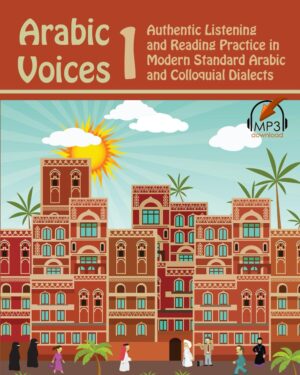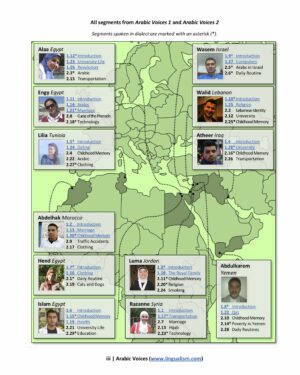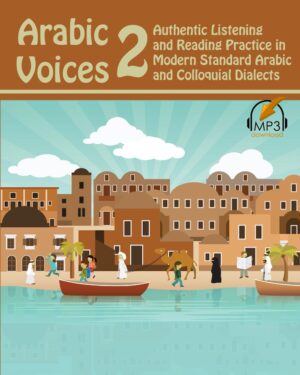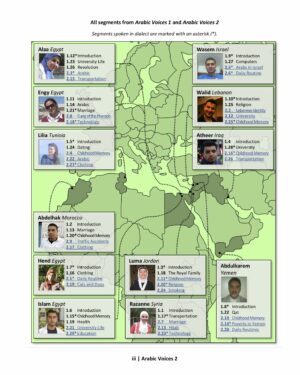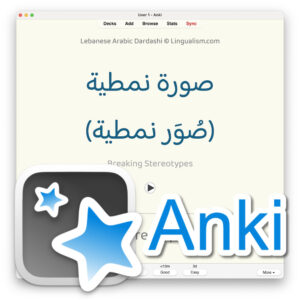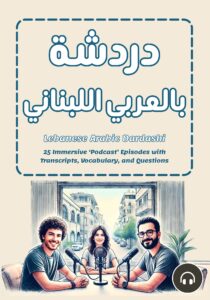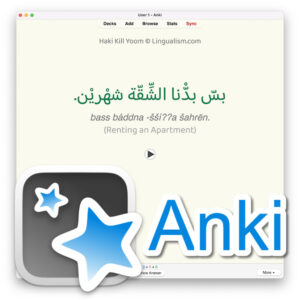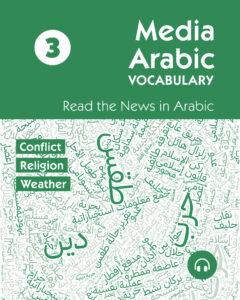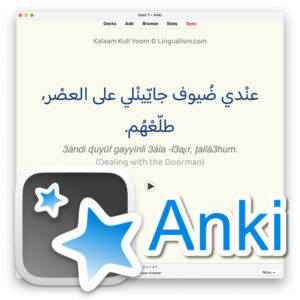Home » Modern Standard Arabic » University Life–Alaa
University Life–Alaa
| Greetings and welcome! [00:00] | السلام عليكم ورحمة الله وبركاته. أهلاً ومرحبًا بكم. | |
| Today we will talk about what Alaa had to say about her life at university, and how life at university is different from working life after graduation. [00:04] | اليوم سنتحدّث عمّا قالته آلاء بشأن حياتها في الجامعة، وكيف أن الحياة في الجامعة تختلف عن الحياة العملية بعد التخرج. | |
| We will comment on the different terms and words she used, as well as the different grammatical forms. [00:15] | سنعلّق على ما استخدمته من مصطلحاتٍ وكلماتٍ مختلفة، وكذلك من صيغ نحوية مختلفة. | |
| Let's start! And we'll start with line 2. Alaa says, "I will talk to you about university life today." So Alaa uses the سـ here with the imperfect tense to talk about the future. [00:23] | هيا بنا نبدأ، ونبدأ بالسطرالثاني تقول آلاء: (سأحدثكم اليوم عن الحياة الجامعية) فتستخدم آلاء هنا حرف [ السين] مع [المضارع] للحديث عن المستقبل. | |
| We have mentioned this before, and we said that سـ and the imperfect tense are used to express an action in the future. [00:40] | وكنا قد أشرنا إلى هذا من قبل، وقلنا أن حرف [ السين] و[الفعل المضارع] يستخدمان للتعبير عن عمل في المستقبل. | |
| We also said that you can express the future using سوف and the imperfect tense. [00:51] | كما قلنا كذلك أنك يمكنك أن تعبر عن المستقبل باستخدام [سوف والفعل المضارع]. | |
| This is a quick reminder to what we had said about talking about the future using سـ or سوف and the imperfect tense. [00:59] | وهذه تذكرة سريعة إلى بما كنا قد قولناه بشأن الحديث عن المستقبل باستخدام [السين والفعل المضارع] أو [سوف والفعل المضارع]. | |
| We then move on to what Alaa used on line 3. Alaa says, "And I will talk about my personal experience when I entered university." [01:12] | ننتقل بعد ذلك إلى ما استخدمته آلاء في السطر الثالث—تقول آلاء: (و سأتكلم عن تجربتي الشخصية حينما التحقت بالجامعة). | |
| Here, Alaa uses حينما (when) to talk about a certain period of time, and to associate an action with a certain period of time. [01:23] | تستخدم آلاء هنا [حينما] للحديث عن فترة زمنية معينة، وربط عمل ما بفترة زمنية معينة. | |
| In fact, the word حينما is made up of two different words, the word حين (while), which means a period of time, and the word ما (what). [01:38] | وفي الحقيقة كلمة [حينما] هي تتكون من كلمتين مختلفتين، كلمة [حين] وتعني فترة زمنية، وكلمة [ما]؛ | |
| And when you combine them together, you can use them to connect two clauses, provided that they are... ... the second part should be a part related to a specific time period. [01:47] | وعند إدماجهما معًا يمكنك أن تستخدمها للربط بين جملتين على أن تكون... على أن يكون الجزء الثاني جزء يتعلّق بفترة زمنية معينة. | |
| As Alaa says here, "I will talk about my personal experience when I joined the university) i.e. what time did she or she entered university." [02:00] | كما تقول آلاء هنا: (سأتكلم عن تجربتي الشخصية حينما التحقت بالجامعة) أي وقت ما التحقت أو التحقت هي بالجامعة. | |
| For example, you can say, "I bought this book when I was in Egypt." During the time I was in Egypt, I bought this book. I bought the book when I was in Egypt. I read a lot of books when I was studying, and so on. [02:12] | يمكنك أن تقول مثلًا: (اشتريت هذا الكتاب حينما كنت في مصر) ففي الفترة الزمنية التي كنت بها في مصر أنت اشتريت هذا الكتاب (اشتريت الكتاب حينما كنت في مصر، قرأت الكثير من الكتب حينما كنت أدرس)، وهكذا. | |
| Great! That was about حينما. Aand on line 5, Alaa uses a form similar to حينما, and we had said that the word is حين plus ما. And on line 5, we use بعدما (after), which is بعد (after) and ما (what), which become one word that links a period of time, as well as a verb. [02:36] | عظيم! هذا بشأن [حينما] وفي السطر الخامس تستخدم آلاء صيغة مشابهة لحينما وكنا قد قلنا أن كلمة حينما هي حين وما وفي السطر الخامس تستخدم آلاء [بعدما] وهي [بعد و ما] يصبحان كلمة واحدةتربط بين فترة زمنية كذلك وفعلٍ ما. | |
| But the word بعدما associates an action after the expiration of a period of time... After the expiration of a period of time as is evident from the use of the word. [03:04] | ولكن كلمة [بعدما] تربط عملًا بعد انتهاء فترة زمنية... بعد انتهاء فترة زمنية كما هو واضح من استخدام الكلمة. | |
| In the example here, Alaa says, "As much as I miss it now, after I graduated from university..." That is, after the end of the graduation period and the period of study, after the completion of graduation and study, she longs for university life. [03:15] | ففي المثال هنا تقول آلاء: (بقدر ما أشتاق إليها الآن بعدما تخرجت من الجامعة) أي بعد انتهاء فترة التخرج وفترة الدراسة بعد الانتهاء من التخرج والدراسة هي تشتاق إلى الحياة الجامعية. | |
| For example, you can say: I drank after I ate; I bought the book after I went to the library; or after I went to the bookstore, and so on. [03:35] | يمكنك أن تقول مثلًا: (أنا شربت بعدما أكلت، أنا اشتريت الكتاب بعدما ذهبت إلى المكتبة أو بعدما ذهبت إلى دار الكتب) وهكذا. | |
| You are referring to... the expiration of a certain period of time. [03:52] | فأنت تشير إلى فا... انتهاء فترة زمنية معينة. | |
| Great! حينما and بعدما. [03:59] | عظيم! [فحينما وبعدما]. | |
| Then we move on to another word that she used on line 5, which is the word انخرطت in the working field. [04:03] | بعد ذلك ننتقل إلى كلمة أخرى استخدمتها في السطر الخامس وهي كلمة [انخرطت] في المجال العملي. | |
| Alaa here uses the word انخرطت to express that she has not only started in the working field, but has been very busy in this field of work. [04:14] | فتستخدم آلاء هنا كلمة [انخرطت] للتعبير على أنها ليس فقط قد بدأت في المجال العملي، ولكنها قد انشغلت جدًا في هذا المجال العملي. | |
| So, started some work and got very busy with it. [04:31] | فـ[انخرط في] أي أنه بدأ في عمل ما وانشغل فيه جدًا. | |
| For example, you can say, "I got involved in work." meaning I got involved in work, that is, I became very busy with this work. I got involved in it. [04:37] | يمكنك أن تقول مثلًا: (أنا انخرطت في العمل) معنى انخرطت في العمل أي أنني أصبحت مشغولًا جدًا بهذا العمل [انخرط فيه]. | |
| Next, we want to refer to what Alaa used on line 10. She says, "This complex was located near the Library of Alexandria." [04:49] | بعد ذلك نريد الإشارة إلى ما استخدمته آلاء في السطر العاشر—فهي تقول: (كان هذا المجمع يقع بالقرب من مكتبة الإسكندرية). | |
| The word يقع (is located) is used when talking about a specific location, or a geographical location, for example, [05:04] | وكلمة (يقع) تُستخدم عند الحديث عن موقع معين، أو موقع جغرافي مثلًا | |
| so she says, "This library is located in the north of the city or this... this organization is located in California, for example. [05:12] | فتقول: (هذه المكتبة تقع في شمال المدينة أو هذا... هذه المنظمة تقع بولاية كاليفورنيا) مثلًا. | |
| You can use [located to] or [located to] to... to specify a specific geographic location [located at or located in]. [05:24] | فيمكنك أن تستخدم [يقع بـ] أو [يقع في] ل... لتحديد موقع جغرافي معين [يقع بـ أو يقع في]. | |
| Then on line 12, Alaa uses the word جذريًا with the word اختلافًا saying "and the university and college in general are fundamentally different from the school," and when you say اختلافًا جذريًا (fundamentally different), you mean that there is a very big difference, and this word–or these two words–are used together a lot. [05:37] | بعد ذلك في السطر الثاني عشر تستخدم آلاء هنا كلمة [جذريًا] مع كلمة [اختلافًا] تقول (وتختلف الجامعةوالكلية بشكلٍ عام عن المدرسة اختلافًا جذريًا) وعندما تقول [اختلافًا جذريًا] أنت تعني أن هناك اختلاف كبير جدًا، وهذه الكلمة أو هاتين الكلمتين يستخدمان معًا كثيرًا. | |
| We would like to point out here that in the Arabic language, as well as in the English language, and many languages, there are words that we often use together to express something. [06:07] | ونود الإشارة هنا إلى أن في اللغة العربية، وكذلك في اللغة الإنجليزية، وكثير من اللغات، هناك كلمات كثيرًا ما نستخدمهما معًا للتعبير عن شيءٍ ما، | |
| For example, an adjective that we use with a noun frequently during our conversation. [06:19] | يعني مثلًا صفة نستخدمها مع اسم بصورة متكررة أثناء حديثنا. | |
| One of these phrases is اختلافًا جذريًا. When we say this, we mean that there is a big difference. [06:25] | ومن هذه الكلمات كلمة [اختلافًا جذريًا] عندما نقول اختلافًا جذريًا نعنى أن هناك اختلافًا كبيرًا. | |
| For example, you can say, "Life in Egypt is fundamentally different from life in America, meaning that there is a very, fundamental difference. [06:33] | يمكنك أن تقول مثلًا: (الحياة في مصر تختلف عن الحياة في أمريكا اختلافًا جذريًا) أي أن هناك اختلاف كبير جدًا اختلافًا جذريًا. | |
| While talking about expressions or words we use together, we would also like to refer to what Alaa used on line 16. [06:47] | وأثناء الحديثعن المصطلحات أو الكلمات التي نستخدمها معًا، نود الإشارة كذلك إلى ما استخدمته آلاء في السطرالسادس عشر... | |
| On line 16, Alaa says, "Of course, this is a huge difference. [07:04] | في السطر السادس عشر—تقول آلاء: (وبالطبع هذا فرقٌ شاسع). | |
| So Alaa uses the word شاسع (vast) with the word فرق (difference), and this… ... we often use these two words together as well, and they mean a big difference. [07:11] | فتستخدم آلاء هنا كلمة [شاسع] مع كلمة [فرق] و هذه... هاتين الكلمتين نستخدمهما كثيرًا معًا كذلك، وتعني فرقًا كبيرًا. | |
| We can say, for example, "There is a big difference between life in Egypt and life in America." or "There is a huge difference between life in Egypt and life in America. A huge difference, that is, a very big difference. [07:23] | يمكننا أن نقول مثلًا: (هناك فرقٌ كبير بين الحياة في مصر والحياة في أمريكا) أو (هناك فرقٌ شاسع بين الحياة في مصر والحياة في أمريكا) فرقٌ شاسع أي فرقٌ كبير جدًا. | |
| فرقٌ شاسع and اختلافًا جذريًا. You can use both phrases when you want to use a purer or eloquent word than just a big difference or a big difference. [07:41] | [فرقٌ شاسع واختلافًا جذريًا] كلا المصطلحين يمكنك أن تستخدمهما عندما تود أن تستخدم لفظًا أكثر فصاحة أو أكثر بلاغة من فقط اختلافًا كبيرًا أو فرقًا كبيرًا. | |
| You can say a drastic difference and a vast difference. [07:59] | يمكنك أن تقول اختلافًا جذريًا وفرقًا شاسعًا. | |
| Great! We would then like to refer to what Alaa used on line 23. Alaa says, "For example, in school, there was a private bus." [08:05] | عظيم! نود بعد ذلك الإشارة إلى ما استخدمته آلاء في السطر الثالث والعشرون—تقول آلاء: (فمثلًا في المدرسة كان هناك باصًا خاصًا). | |
| In fact, Alaa uses the word باص here, which is a word from the English language, of course, and it has been Arabized as well, and even takes case suffixes as a word in Standard Arabic. [08:20] | وفي الحقيقة تستخدم آلاء هنا كلمة [باصًا] وهي كلمة من اللغة الإنجليزية بالطبع، وقد تم تعريبها وكذلك تم إعرابها على أنها كلمة لغة عربية فصحى. | |
| But really, this is not the purest. If you want to speak Standard Arabic, you can use the word حافلة instead of the word باص. [08:35] | وفي الحقيقة هذا ليس في تمام البلاغة؛ إذا أردت أن تتحدّث العربية الفصحى، فيمكنك أن تستخدم كلمة [حافلة] بدلًا من كلمة [باصًا]. | |
| We had previously indicated that there are many Arabized words such as computer and the brand names. And we have referred to many words; it's better to use the word حافلة than the word باص if you want to speak in (pure) Standard Arabic. [08:47] | كنا قد أشرنا من قبل إلى أن هناك كلمات كثيرة معربة مثل كمبيوتر وكلمة الماركات، و أشرنا إلى عديد من الكلمات، كلمة [باصًا]... من الأفضل أن تستخدم كلمة [حافلة] بدلًا من [باصًا] إذا أردت أنتتحدّث في العربية الفصحى. | |
| You can use the word حافلة instead of the word باص. [09:08] | فيمكنك أن تستخدم كلمة [حافلة] بدلًا من كلمة [باصًا]. | |
| You can say, "There was a special bus that would pick us up," and so on. [09:13] | فيمكنك أن تقول: (كان هناك حافلة خاصة تمر علينا) وهكذا. | |
| Great! Then we move on to line 27. Alaa says, "That was fun; for about thirty... thirty minutes a day I'd spend on my way to college." [09:22] | عظيم! ننتقل بعد ذلك إلى السطرالسابع والعشرون—تقول آلاء: (فكان ذلك ممتعًا حوالي ثلاثين... ثلاثين دقيقة يوميًا أقضيها وأنا في طريقي إلى الكلية). | |
| حوالي (about) is a word for تقريبًا (approximately). You can say either one. [09:42] | [حوالي] هي كلمة تعبر عن [تقريبًا]، يمكنك أن تقول [تقريبًا]، يمكنك أن تقول [حوالي أن]... | |
| You don't remember the exact length of time, so you could use the word حوالي or تقريبًا to indicate that you are not saying the duration precisely but approximately. [09:50] | أنت لا تتذكر المدة الزمنية بالتحديد، فيمكنك أن تستخدم كلمة [حوالي] أو كلمة [تقريبًا] للإشارة إلى أنك لا تقل المدة بالدقة ولكن تقريبًا. | |
| "I spent about half an hour in the library." or "I spent approximately half an hour in the library." These words indicate the length of time that is not... that don't specify exactness. [10:05] | (أنا قضيت بالمكتبة حوالي نصف ساعة) أو (قضيت بالمكتبة نصف ساعة تقريبًا) [حوالي] أو [تقريبًا] للإشارة إلى المدة الزمنية التي لا... لا تذكرها بالتحديد، | |
| And they often come about after the time period and about before the time period. [10:22] | وغالبًا ما تأتي تقريبًا بعد المدة الزمنية وتأتي حوالي قبل المدة الزمنية. | |
| Great ! We then move on, finally, to another word, which Alaa uses on line 39. "This is the real treasure I got out of college: my friends in life I know now," says Alaa. [10:30] | عظيم ! ننتقل بعد ذلك، وأخيرًا إلى كلمة أخرى، وقد استخدمتها آلاء في السطر التاسع والثلاثون—تقول آلاء: (هذا هو الكنز الحقيقي الذي خرجت به من الجامعة، أصدقاء عمري الذين أعرفهم الآن). | |
| Alaa points to her very close friends who… she has kept for a long time… for a long time. She says they or they are أصدقاء عمرها (her lifelong friends). [10:53] | فتشير آلاء إلى أصدقائها المقربين جدًا وال… واللاتي قد احتفظت بهن إلى مدةٍ كبيرة لمدةٍ... لمدةٍ زمنية كبيرة، و تقول أنهم أو أنهن [أصدقاء عمرها]. | |
| When you say that so-and-so is your 'friend of your life', that is, you have known him for a long time. [11:13] | عندما تقول أن فلان أو شخص ما هو [صديق عمرك] أي أنك تعرفه منذ زمنٍ بعيد. | |
| For example, I say, "Ahmed is a friend of my life, I have known him for twenty years, and we are still friends." [11:22] | مثلًا أقول: (أحمد هو صديق عمري، أنا أعرفه منذ عشرون عامًا، ومازلنا أصدقاء). | |
| A lifelong friend is a very close friend to you, with whom you spent a very large period of your life, and you have known him for a large period of your life. This is a llifelong friend. [11:31] | فصديق العمر هو صديق مقرب لك جدًا، وقضيت معه مدةً كبيرة جدًا من حياتك، وتعرفه لمدةٍ كبيرة من حياتك، هذا هو صديق عمرك، صديق العمر. | |
| And this is... another word or term... another term that you can use while speaking in Arabic. [11:45] | وهذه... كلمة أخرى أو مصطلح... مصطلح آخر يمكنك أن تستخدمه أثناء حديثك بالعربية. | |
| And with this, we have finished commenting on what Alaa said about university life. [11:55] | وبهذا نكون قد انتهينا من التعليق عما قالته آلاء بشأن الحياة الجامعية. | |
| Until we meet again! Take care! [12:03] | إلى لقاء آخر، ألقاكم على خير. | |
| Thank you very much. May the peace, mercy and blessings of God be upon you. [12:07] | أشكركم شكرًا جزيلًا، والسلام عليكم ورحمة الله وبركاته. |
Video Lessons
Arabic Voices MSA Lessons
Arabic teacher Mostafa Ahmed takes us through segments in MSA from Lingualism's book Arabic Voices 1: Authentic Listening and Reading Practice in Modern Standard Arabic and Colloquial Dialects, explaining interesting points of grammar and vocabulary.

